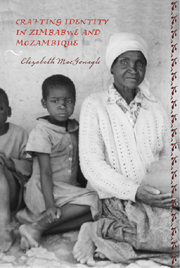Book contents
- Frontmatter
- Contents
- List of Illustrations
- Acknowledgments
- 1 A Mixed Pot: The Crafting of Identity
- 2 The Historical Landscape of Southeast Africa
- 3 Early Exchanges: Political and Economic Contexts
- 4 Ties That Bind: Social Structures and Cultural Practices
- 5 Keeping up Appearances: Identity and Adornment
- 6 Brewing Beer, Making Rain, and Holding Court
- 7 Memories and Identities in the Shadow of Ngungunyana
- 8 Past and Present in the Ndau Region
- Notes
- Glossary of Ndau and Portuguese Words
- Bibliography
- Index
- Rochester Studies in African History and the Diaspora
3 - Early Exchanges: Political and Economic Contexts
Published online by Cambridge University Press: 12 September 2012
- Frontmatter
- Contents
- List of Illustrations
- Acknowledgments
- 1 A Mixed Pot: The Crafting of Identity
- 2 The Historical Landscape of Southeast Africa
- 3 Early Exchanges: Political and Economic Contexts
- 4 Ties That Bind: Social Structures and Cultural Practices
- 5 Keeping up Appearances: Identity and Adornment
- 6 Brewing Beer, Making Rain, and Holding Court
- 7 Memories and Identities in the Shadow of Ngungunyana
- 8 Past and Present in the Ndau Region
- Notes
- Glossary of Ndau and Portuguese Words
- Bibliography
- Index
- Rochester Studies in African History and the Diaspora
Summary
There is plenty of ivory in Sofalla and some amber and also gold with which people come from Quiteve and Manica to buy merchandise.
—Fr. Felippe da Assumpção, ca. 1698Therefore Kaffirs who are careful to choose laborious wives are the richest, and have the most provisions.
—Fr. João dos Santos ca. 1580As the Ndau exchanged gold, ivory, and other commodities in the Indian Ocean trade, they developed relationships with neighbors in southeast Africa, Muslims from the Swahili coast, and Portuguese in the region. This ebb and flow of contacts over several centuries in turn strengthened group identities and ideas about being interconnected for those living in the Ndau region. This chapter discusses the economic and political contexts that shaped ethnic boundaries in the wider world of the Ndau by examining trade (both local and long-distance) and political relations between 1500 and 1900. The focus is on activities between the Zambezi and Save Rivers, for similar patterns of trade and related political systems influenced ethnic identities as well as notions of the “other” across this space. Large states, confederations, and smaller polities tied to commercial exchanges and flourishing economies existed at various times in the region, and trading networks and lines of communication helped maintain cultural similarities. Political identifications occurred at multiple levels as villagers and chiefs alike recognized overrule by larger states and paid tribute to Shona-speaking dynasties in the north and west such as the Mutapa, Torwa, and Changamire.
- Type
- Chapter
- Information
- Crafting Identity in Zimbabwe and Mozambique , pp. 39 - 52Publisher: Boydell & BrewerPrint publication year: 2007



